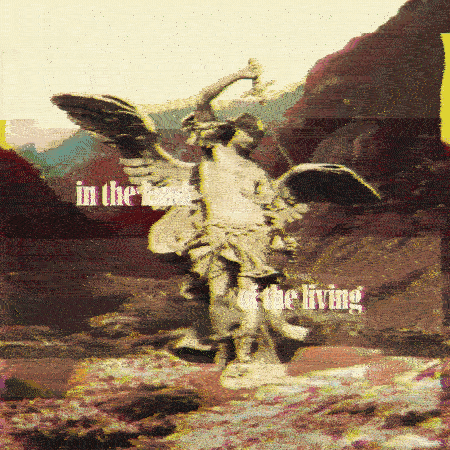I cried to thee, O Lord: I said: Thou art my hope, my portion in the land of the living. (Psalm 141:6 DR)
Having found no one save the Lord to be mindful of his soul amidst the temptations and tribulations which bore down upon him, the Psalmist now turns the focus from an interior appraisal of his desire and will and now turns it outward, so to speak, such that it is directed towards the Lord.
In this movement—as it were—there is really no movement, for the original plea which led off this Psalm is now completed. That is, he began by crying to the Lord and pouring out his prayer in the sight of God. And here that orientation of his will is brought to fruition, as the Lord being his hope was the very reason for his prayer in the first place. This seeming vacillation between hope and despair and back again is in reality the interplay of time and understanding within the human soul. This Psalm, after all, begins with the title of understanding for David. As he places his hope in the Lord while in the cave—both literally and spiritually—that understanding comes to him.
Importantly, his circumstances do not suddenly change, nor on the literal level has he yet found deliverance. Yet in prayer and communion with God he finds the true and sole source of his hope, his portion in the land of the living. The understanding for which this Psalm was written comes not in an intellectual tidying up of all loose ends but rather in a total abandonment to God’s will. He finally understands that it is in God alone that he will find his portion:
He who in his own person is the Lord’s portion, or has the Lord for his portion, must so bear himself as to possess the Lord and to be possessed by Him. He who possesses the Lord and who says with the Prophet, The Lord is my portion, can hold to nothing beside the Lord. For if he holds to something beside the Lord, the Lord will not be his portion. (St. Jerome, Letter 52.5, ACCS.)
In a parallel passage the Psalmist speaks more fully of this portion, in that the Lord both is the One Who is his inheritance and the One Who will restore it to him:
The Lord is the portion of my inheritance and of my cup: it is thou that wilt restore my inheritance to me. The lines are fallen unto me in goodly places: for my inheritance is goodly to me. (Psalm 15:5-6 DR)
This restoration of his inheritance was on the literal level the fulfillment of God’s promise to David to make him king over Israel, but on the spiritual level is nothing less than the redemption of man and his restoration to friendship with God:
Let others choose for themselves portions, earthly and temporal, to enjoy: the portion of the Saints is the Lord eternal. Let others drink of deadly pleasures, the portion of My cup is the Lord. In that I say, Mine, I include the Church: for where the Head is, there is the body also. For into the inheritance will I gather together their assemblies, and by the inebriation of the cup I will forget their old names. You are He who will restore to Me My inheritance: that to these too, whom I free, may be known the glory wherein I was with You before the world was made. [John 17:5] For You will not restore to Me that which I never lost, but You will restore to these, who have lost it, the knowledge of that glory: in whom because I am, You will restore to Me. (St. Augustine, Expositions on the Psalms, 15, 5.)
Here the Psalmist speaks prophetically in the person of our Lord and Savior Jesus Christ, and the inheritance that is received is the Holy Catholic Church, His own Body redeemed by His blood, as St. Paul speaks:
For both he that sanctifieth, and they who are sanctified, are all of one. For which cause he is not ashamed to call them brethren, saying: I will declare thy name to my brethren; in the midst of the church will I praise thee. And again: I will put my trust in him. And again: Behold I and my children, whom God hath given me. Therefore because the children are partakers of flesh and blood, he also himself in like manner hath been partaker of the same: that, through death, he might destroy him who had the empire of death, that is to say, the devil: And might deliver them, who through the fear of death were all their lifetime subject to servitude. (Hebrews 2:11-15 DR)
Since—as St. Paul says—our Lord and His Body the Church are all of one, what is said prophetically of Christ can be applied to His Body the Church. St. Augustine brings out the notion that Christ of Himself has restored to Him that which He never lost—that is, because He was without sin—because in Him the members of His mystical Body the Church are restored to that communion with God in holiness and sanctification that was lost by Adam through the Fall. Our Lord thus receives this inheritance which the Church as His mystical Body partakes in, and thus the inheritance is restored.
And as it is only in Christ that we are brought out of the kingdom of darkness and into the kingdom of light, and brought from death unto life, within the holy Catholic Church is found that portion in the land of the living, for it is in Christ that we live and it is through the Church that we are in Christ, just as the branches are united to the vine and find their life therein (cf. John 15:1-6). This portion in the land of the living thus cannot be separated from union with Christ in His Church:
Unto you have I cried, O Lord: I have said, You are my hope. When I endured, when I was in tribulation, I said, You are my hope. My hope here, therefore I endure. But my portion, not here, but in the land of the living. God gives a portion in the land of the living; but not something from Himself without Himself. What will He give to one that loves Him, save Himself? (St. Augustine, Expositions on the Psalms, 141, 12.)
As St. Jerome noted above, this portion and inheritance is nothing else but God Himself, and if it is predicated on anything besides Him then it is not really the case that God is one’s portion. The parable of the Prodigal Son demonstrates this well, as the older brother held to his portion in obedience to his father in contrast to the Prodigal, yet in his heart he was as far from his father as his brother was in his sins. The father tells him:
Son, thou art always with me, and all I have is thine. (Luke 15:31)
Had the elder brother been united to his father in charity and will, he would have possessed everything his father did. Yet since he wanted what he could call his own just like his prodigal brother, he ended in disappointment and frustration, not even receiving what he thought he wanted. Yet the prodigal who came home in repentance and humility became united to his father in charity and will, and even though he came to his father with nothing, he then received everything, his portion in the land of the living:
O Lord, why give me some other inheritance? Whatever you give, it isn’t worth much. You be my inheritance; I love You, I love You with all I am, with all my heart, with all my soul, with all my mind I love You. What can it mean to me, anything you give my apart from Yourself? This is to love God freely, to hope in God for God, to hasten to be filled with God, to be satisfied with Him. He, after all, is enough for You; apart from Him, nothing is enough for you. (St. Augustine, Sermon 334.3, ACCS.)
I isolated this image of St. Michael the Archangel and composited it in After Effects on top of an instance of I Ate Mushrooms, which creates AI generated transitions between like subject matter, in this case mountainous landscapes.
I then added in some glitch and camera effects to give it some stylization.
Enjoy.
I cried to thee, O Lord: I said: Thou art my hope, my portion in the land of the living.
(Psalm 141:6 DR)
View a higher quality version of this gif here:












Share this post